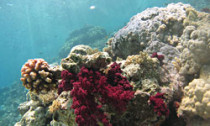
Coral reefs worldwide suffer damage due to pollution and overuse, but scientific research reveals another damaging factor: an ingredient in the sunscreen used by swimmers and sunbathers. National Centers for Coastal Ocean Science researchers and their partners have discovered that a sunscreen chemical commonly used in many soaps, cosmetics and body fragrances is highly toxic to corals. The team’s data show that even very low concentrations of benzophenone-2, or BP-2, can quickly kill juvenile corals.
BP-2 is an additive used in personal-care products since the 1960s to protect against the damaging effects of ultraviolet light.
The team also found that BP-2 causes colorful corals to bleach and can potentially induce or increase mutation in corals by causing damage to their DNA, the genetic material that defines characteristics of organisms.
BP-2 is not removed in most municipal wastewater treatment facilities. This discharge is often directly released in coastal waters of the Caribbean and the Indo-Pacific, threatening near-shore coral reefs.
Although pollution from other sources is a major cause of coral reef degradation and is the easiest factor to mitigate, BP-2 as a pollutant has largely been ignored, according to C.A. Downs, lead author of the study.
“In the case of BP-2 pollution, there are a range of options that can be considered for reducing its impact to reefs – from working with manufacturers and innovating more environmentally sustainable products to educating consumers regarding product selection and product disposal,” he said.
The Centers for Coastal Ocean Science are affiliated with the National Oceanic and Atmospheric Administration. The researchers published this work in the December 2013 issue of Ecotoxicology.











Social Profiles